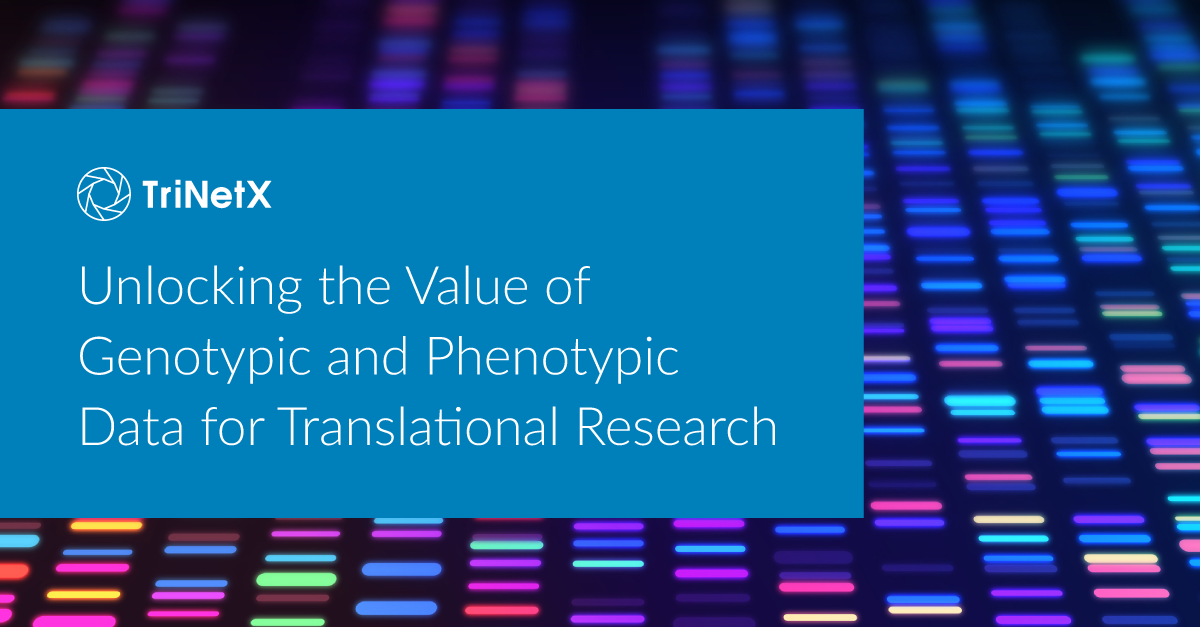The advent of precision medicine is revolutionizing diagnostics and treatment across a broad range of illnesses. Genetic biomarkers are increasingly using DNA, RNA and protein sequencing results, and are an integral part of the precision medicine revolution and beginning to play a major role in clinical care as well as translational research. The integration of available genomic profile data with a patient’s phenotypic data set (typically consisting of demographics, diagnoses, medications, procedures, laboratory results and other observations) is of increasing value to both clinical and basic researchers.
Clinical trial eligibility criteria are more frequently including molecular variants, as targeted therapies rely more on mutational characteristics of disease mechanism. The scientific goal of a trial might be to explain the genomic dependence for the treatment being studied. Basic biomedical investigations may use integrated phenotypic and genotypic data to suggest possible avenues for determining disease mechanism or potential treatment strategies. For clinical studies, focusing on specific biomarkers that predict a patient’s response to a particular treatment may enables researchers to study a smaller number of patients, thereby accelerating timelines and driving down the cost of treatment development.
The TriNetX platform offers a seamless integration between phenotypic and genotypic data. For example, with oncology, TriNetX focuses on tumor genotyping. Genotyping results are represented as the presence or absence of specific variants in particular DNA/RNA sequences and/or protein structures as well as structural variants which occur at the chromosome level such as translocations or fusions.
Tumor genotyping is important because many tumors have key “driver” oncogenes that can be controlled with highly targeted inhibitor therapies. In fact, several present-day treatment guidelines require molecular testing. Results of such testing are crucial for identifying patients who might be candidates for particular targeted therapy. In addition to tumor genotyping, TriNetX collects hematopoietic molecular test results which includes blood borne cancers. And TriNetX collects both somatic and germline genetic data related to cancers as well as other diseases, such as Alzheimer’s.
Healthcare organizations may leverage TriNetX’s toolkit to parse out and process numerous genomic data sources and significantly reduce their efforts to leverage data sources including Foundation Medicine XML results files, Tempus Lab json result files, Caris labs XML files, well annotated VCF files and other structured data sources which are becoming more commonplace for molecular test results. The TriNetX toolkit is comprised of a small set of independent software modules that run on a healthcare organization’s server to remove any sensitive data and securely transfer data to the TriNetX platform and return data quality reports. Most of the processing of the genomic data is conducted on the TriNetX platform to keep the footprint small for the healthcare organization’s infrastructure.
TriNetX toolkits are made available at no charge to healthcare organization members of the TriNetX network and include implementation support and periodic software and content updates.
Genomic sequencing is growing exponentially in the healthcare industry as the costs of sequencing has drastically been reduced and the importance of its use in diagnosing and treating patients increases. TriNetX is working with healthcare organizations to liberate this data, as well as with pharmaceutical leaders on the TriNetX network to offer new targeted therapies to patients who need them most.
If you would like to learn more about leveraging genomic data, please contact join@trinetx.com.

